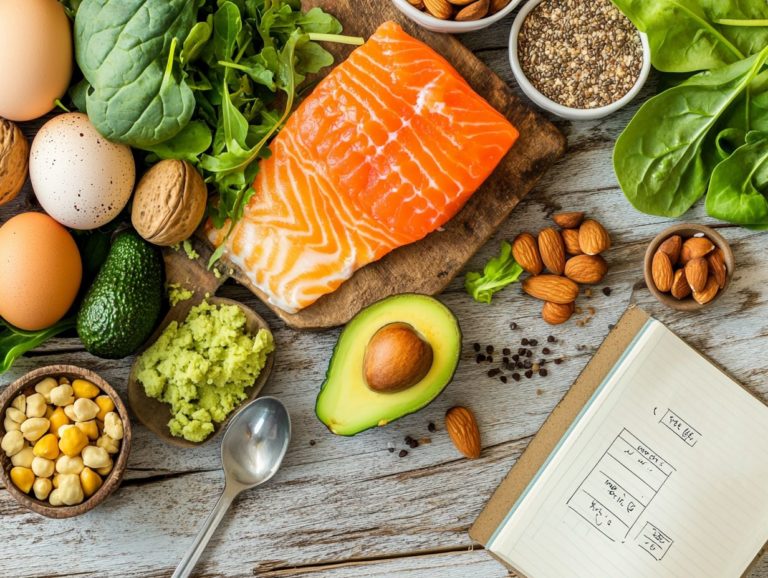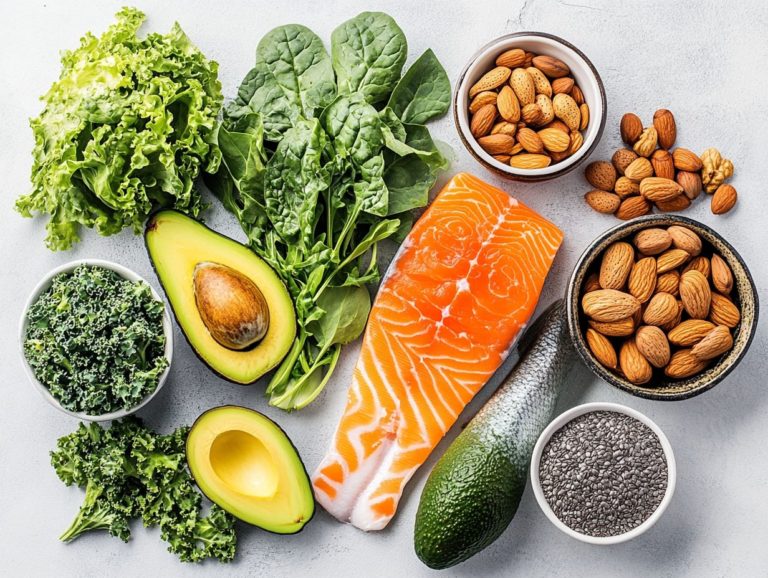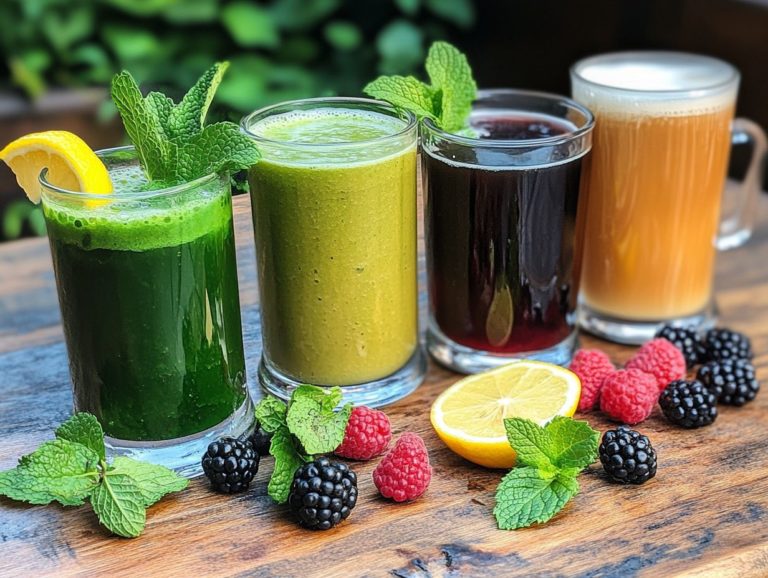Keto Diet: The Role of Fats Explained
The Keto diet has become a sensation in the health and wellness realm, drawing in those eager to shed pounds and embrace a transformative lifestyle through a low-carb diet.
At its core, this low-carb, high-fat approach emphasizes the strategic use of dietary fat. This choice can prove advantageous or detrimental based on your selections, impacting factors like cholesterol levels and body weight.
This article delves into the essential principles of the Keto diet, outlining the types of fats including saturated fats, polyunsaturated fats, monounsaturated fats, and even trans fats you should incorporate, how to do so effectively, and debunking prevalent misconceptions.
Embark on a journey to discover the full potential of healthy fats like omega-3 fatty acids and omega-6 fatty acids in your Keto experience. Discover how these fats can boost your heart health and make you feel fantastic!
Contents
Key Takeaways:

- Fats play a crucial role in the Keto diet as they provide energy and help the body enter a state of ketosis.
- Focus on consuming healthy fats such as avocado, fatty fish, and olive oil for numerous health benefits.
- Limit unhealthy fats to avoid hindering weight loss and increasing heart disease risk.
What is the Keto Diet?
The Keto diet, short for ketogenic diet, represents a sophisticated low-carb approach that prioritizes high fat intake to initiate a body s energy process known as ketosis. In this state, your body transitions from burning carbohydrates for fuel to utilizing fat instead.
This dietary strategy emphasizes a considerable reduction in carbohydrate consumption while encouraging an increase in healthy fat sources. By fundamentally transforming how your body processes energy, you harness dietary fat to promote weight loss, elevate metabolic health, and bolster cardiovascular wellness all while ensuring nutritional balance to avoid deficiencies.
What are the Basic Principles of the Keto Diet?
The fundamental principles of the Keto diet center on significantly cutting back on carbohydrate intake while ramping up fat consumption, with the goal of entering a state of ketosis. This metabolic shift allows your body to become highly efficient at burning fat for energy.
By adjusting your macronutrient ratios, you re encouraged to make thoughtful choices about the types of fats you consume. This is essential not just for weight loss but for enhancing your overall metabolic health.
Typically, you ll find that about 70-75% of your total daily calories should come from fats, while protein takes up around 20-25%, and carbohydrates are kept to about 5-10%.
Choosing the right types of fats is crucial for unlocking the full potential of this eating plan. Saturated fats from sources like coconut oil and grass-fed butter can provide your body with immediate energy. Polyunsaturated fats found in fish and walnuts deliver essential fatty acids. On the other hand, monounsaturated fats from olive oil and avocados can work wonders for your cholesterol levels by raising HDL (the good cholesterol), further supporting heart health.
Together, these healthy fats not only help reduce inflammation but also promote a better biochemical balance creating the perfect foundation for sustained energy and overall well-being.
Ready to embrace the Keto lifestyle? Start today and transform your health!
What is the Role of Fats in the Keto Diet?
Fats play a pivotal role in your Keto diet, acting as the primary energy source to replace carbohydrates. This supports your metabolic health and aids in managing cholesterol levels while reducing the risk of heart disease. Prioritizing healthy fats in your dietary choices is essential.
By including healthy fats like omega-3 fatty acids and monounsaturated fats you enhance your body s ability to maintain balanced cholesterol levels. Ultimately, this promotes a healthier lifestyle overall.
What Types of Fats Should Be Consumed in the Keto Diet?
In the Keto diet, it s crucial to focus on consuming healthy fats while being discerning about the types you include. This primarily means embracing saturated fats, polyunsaturated fats, and monounsaturated fats, while steering clear of trans fats due to their links to various health concerns.
Saturated fats, such as those found in coconut oil and butter, can serve as a swift energy source and may help improve your cholesterol levels when enjoyed in moderation. On the flip side, polyunsaturated fats, abundant in fatty fish like salmon and walnuts, work wonders for heart health by lowering bad cholesterol levels.
Monounsaturated fats, found in olive oil and avocados, also contribute to cardiovascular wellness and possess anti-inflammatory properties.
It s imperative to avoid processed foods laden with unhealthy trans fats. These not only raise harmful cholesterol levels but also increase your risk of heart disease, negating the positive impact of incorporating healthy fats into your diet.
How Much Fat Should Be Consumed in the Keto Diet?
Determining the right amount of fat to consume on the Keto diet is crucial for achieving ketosis and effective weight loss. The general guideline suggests that approximately 70-80% of your total daily caloric intake should come from dietary fat. This underscores the importance of a proper balance of fats, proteins, and carbohydrates.
If you’re following a daily intake of 2,000 calories, that translates to about 155 to 178 grams of fat each day. It’s essential to pay attention to the types of fats you include in your diet; different fats can significantly influence your blood lipid panels and cholesterol levels.
For instance, swapping out saturated fats for unsaturated fats like those from olive oil and avocados can lead to better cholesterol management. This enhances your overall metabolic health.
By carefully selecting your fat sources, you can optimize your Keto results while promoting heart health and maintaining a balanced metabolic process.
What are the Benefits of Consuming Healthy Fats in the Keto Diet?
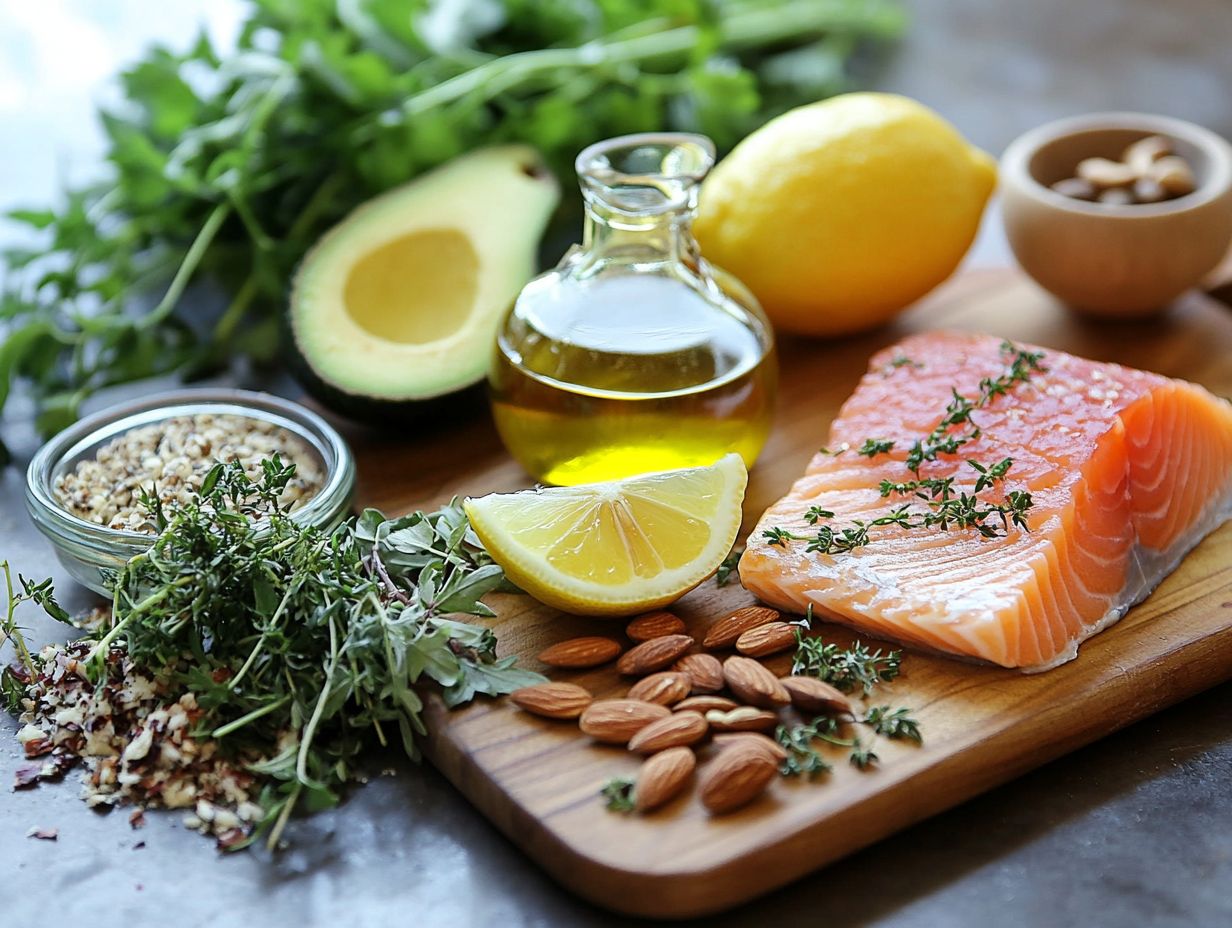
Consuming healthy fats as part of the Keto diet presents a wealth of advantages:
- Enhanced heart health
- Improved cholesterol levels
- Potential reduction in inflammation
These benefits contribute to your overall metabolic wellness. Incorporating fats like omega-3 fatty acids from sources such as fish and flaxseeds along with monounsaturated fats found in avocados and nuts is essential for safeguarding your cardiovascular system.
These beneficial fats work to reduce triglyceride levels and lower blood pressure, effectively diminishing your risk of heart disease. They also bolster your immune system, increasing your resilience against infections and illnesses.
Healthy fats play a pivotal role in regulating appetite hormones, fostering a sense of fullness that aids in weight management. Additionally, they help maintain stable blood sugar levels, which is crucial for keeping your energy levels balanced throughout the day.
What are the Risks of Consuming Unhealthy Fats in the Keto Diet?
The risks associated with consuming unhealthy fats on the Keto diet can indeed overshadow its benefits. Relying on trans fats and highly processed foods can lead to elevated cholesterol levels, increased inflammation, and a heightened risk of heart disease.
It’s essential to be mindful of your fat sources to truly reap the rewards of this dietary approach.
Don’t miss out on the power of healthy fats to enhance your wellness!
How Can Unhealthy Fats Affect Weight Loss in the Keto Diet?
Unhealthy fats can significantly obstruct your weight loss journey on the Keto diet. These fats may contribute to increased body weight and unhealthy metabolic responses. Ultimately, they undermine the diet’s core objectives of promoting fat burning and enhancing energy efficiency.
Often lurking in processed foods and fried items, these detrimental fats can wreak havoc on essential metabolic processes. They do this by fostering inflammation and insulin resistance. When your appetite hormones are thrown off balance, cravings can spiral out of control. This leads to excessive caloric intake and hinders your quest for desired weight-loss results.
On the flip side, embracing healthy fats think avocados, nuts, and olive oil can dramatically enhance your Keto journey! These beneficial fats not only elevate feelings of fullness and satisfaction but also bolster your metabolic health. They play a crucial role in regulating hunger. This makes it far easier for you to maintain a healthy weight and achieve lasting results.
What Are the Potential Health Risks of Consuming Unhealthy Fats in the Keto Diet?
The potential health risks of consuming unhealthy fats while following the Keto diet are significant. You may find yourself facing elevated cholesterol levels, an increased risk of heart disease, and heightened inflammation. All of these can adversely affect your long-term health.
These concerns become more important as the popularity of high-fat diets grows. The types of fats consumed are often overlooked. Trans fats and saturated fats, frequently lurking in fast foods and processed snacks, can lead to plaque buildup in your arteries. This raises the chances of heart attacks and strokes.
Research indicates that a high intake of unhealthy fats is associated with insulin resistance. This sets the stage for type 2 diabetes and other metabolic disorders. To protect your heart health and maintain optimal cholesterol levels, prioritize incorporating healthier fats. Choose those from avocados, nuts, and olive oil.
Make sure to prioritize a balanced intake of fruits, vegetables, and whole grains for a well-rounded diet.
How Can One Incorporate Healthy Fats into the Keto Diet?
Incorporating healthy fats into your Keto diet can be effortlessly achieved through a variety of dietary strategies. By focusing on selecting foods that are rich in nutrients, you not only elevate the flavor of your meals but also unlock a myriad of health benefits that support your well-being.
What Are Some Good Sources of Healthy Fats for the Keto Diet?
Good sources of healthy fats for your Keto diet include delightful options like olive oil, fatty fish such as salmon, avocados, and nuts. These foods not only offer essential fatty acids but also support your overall health.
Incorporating these ingredients into your meals enhances flavor while playing pivotal roles in achieving a balanced, nutrient-rich diet. Olive oil, renowned for its high monounsaturated fat content, can help reduce inflammation and improve heart health. This makes it a staple in many kitchens.
Fatty fish, especially salmon, are excellent sources of omega-3 fatty acids. These are instrumental in lowering triglycerides and significantly aiding in cholesterol management. On the other hand, avocados provide a creamy texture and are loaded with fiber and potassium, further benefiting your cardiovascular health.
Nuts, like almonds and walnuts, serve as versatile snacks. They deliver both protein and fiber, supporting weight management and helping to reduce bad cholesterol. Each of these options caters to various palates, ensuring that your journey toward healthy eating remains both enjoyable and diverse.
Are you ready to transform your Keto experience with healthy fats?
What Are Some Tips for Incorporating Healthy Fats into the Keto Diet?

Incorporating healthy fats into your Keto diet can become a seamless endeavor with thoughtful meal planning and mindful food choices, ensuring that each meal is not only balanced but also aligned with your dietary goals.
To elevate this process, consider setting aside a specific day each week for meal prep. This is your opportunity to explore diverse recipes that showcase healthy fat sources like avocados, nuts, and olive oil.
Being aware of portion sizes is vital in this journey, as it helps you strike the right balance of nutrients while keeping overeating at bay. These dietary adjustments can significantly enhance your cholesterol management and bolster your weight loss efforts by promoting a sense of fullness and curbing cravings.
By making these intentional choices and embracing a variety of flavors, you may discover that the Keto lifestyle is not just sustainable but genuinely enjoyable.
What Are Some Common Misconceptions About Fats in the Keto Diet?
Common misconceptions about fats in the Keto diet can lead to considerable confusion. Many people mistakenly believe that all fats contribute to weight gain.
However, it’s important to recognize that healthy fats play a crucial role in achieving and maintaining ketosis. Understanding this distinction can empower you to make informed dietary choices that align with your health goals.
Do All Fats Contribute to Weight Gain in the Keto Diet?
Not all fats are your enemy when it comes to the Keto diet; in fact, incorporating healthy fats is essential for promoting metabolic health and supporting weight loss, as long as you consume them in appropriate amounts.
These beneficial fats include delicious sources like avocados, nuts, seeds, and olive oil, each playing a critical role in various bodily functions. Research has demonstrated that these fats can actually assist in weight management by promoting satiety, helping you control your hunger levels. They influence the release of appetite hormones like leptin, which signals to your brain that your body is full, thus helping you avoid overeating.
On the flip side, unhealthy fats often lurking in processed foods can lead to inflammation and increased fat storage. That’s why it’s crucial to differentiate between the two types. By maintaining a balanced intake of healthy fats, you can enjoy satisfying meals while keeping your weight in check.
Can One Consume Too Much Fat in the Keto Diet?
While the Keto diet encourages higher fat consumption, it’s important to recognize that consuming too much fat can lead to potential health risks, such as imbalances in nutrient intake and negative impacts on cholesterol levels.
Striking the right balance is essential for maintaining long-term health and achieving your weight loss goals. If you’re aiming for ketosis, remember that quality matters just as much as quantity when it comes to dietary fat. You can effectively monitor your fat intake by using food diaries or mobile apps specifically designed to track macronutrients.
This practice not only helps you stay within recommended fat limits but also ensures you re getting enough protein and carbohydrates. By incorporating a variety of healthy fats think avocados, nuts, and olive oil you can promote nutrient diversity, enhancing your overall well-being while staying true to the principles of the Keto lifestyle.
Is the Keto Diet High in Saturated Fats?
Curious about fats in the Keto diet? Let s find out! The Keto diet may lean towards higher saturated fats. However, it is crucial to focus on the quality of those fats. Opting for sources like coconut oil and grass-fed butter can offer health benefits while also supporting heart health.
This distinction is vital, as not all saturated fats have the same impact on the body. Some studies show that high-quality saturated fats may improve health indicators and possibly even reduce inflammation.
The debate around saturated fats is quite nuanced, with a spectrum of opinions within the nutrition community. While some research presents a more positive view, others raise concerns about eating too much.
It is essential, for anyone following the Keto diet, to be discerning about fat sources and consume them in moderation. This approach will help maximize potential health benefits while minimizing any risks associated with poor-quality fats.
Frequently Asked Questions
What is a Keto Diet and how does it work?
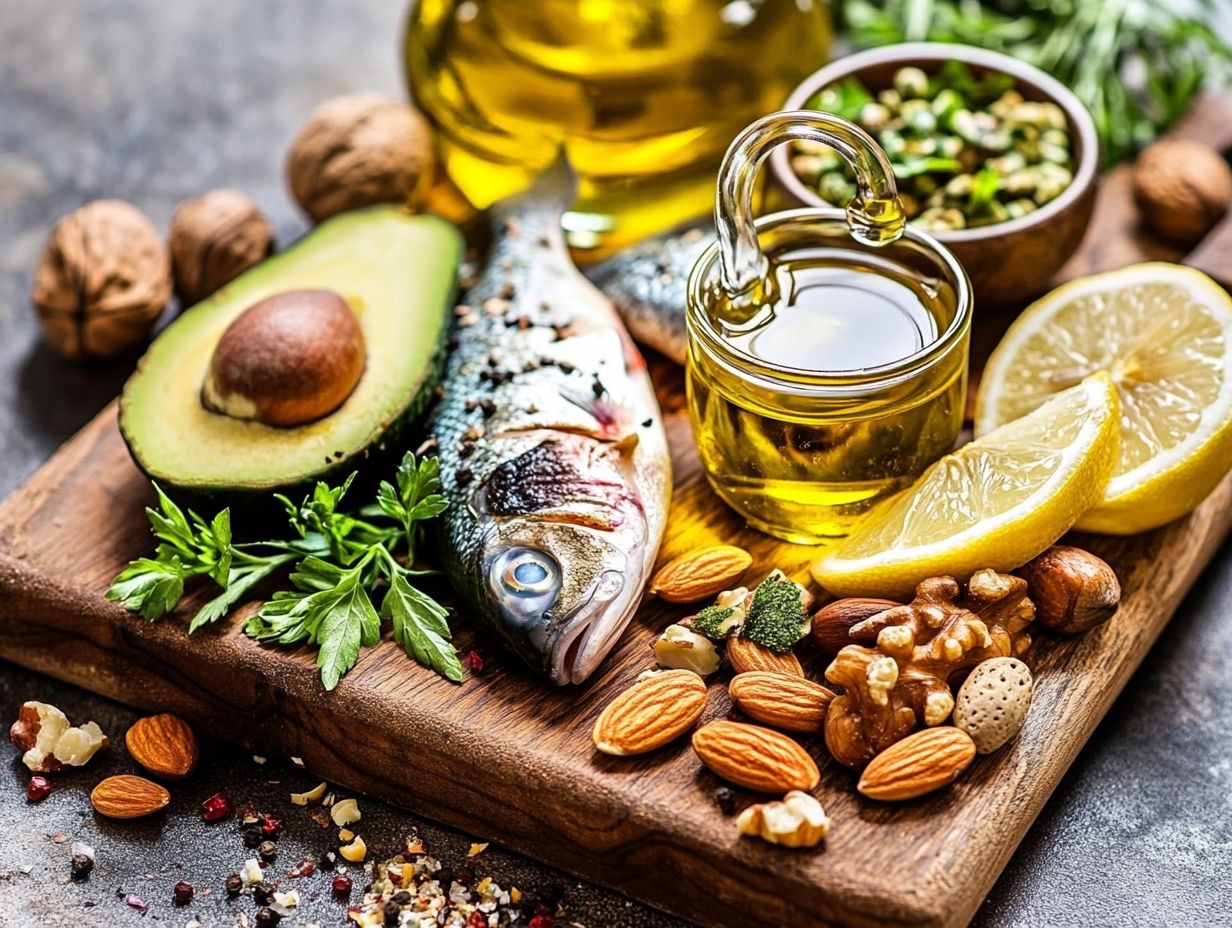
A Keto Diet is a high-fat, adequate-protein, and low-carbohydrate diet. It works by forcing the body to burn fat for energy instead of carbohydrates. This metabolic state, known as ketosis, can also help regulate blood sugar levels and improve insulin sensitivity.
What is the role of fats in a Keto Diet?
Fats play a crucial role in a Keto Diet, providing the majority of the body’s energy needs and helping maintain ketosis, the metabolic state where the body burns fat for energy.
How do fats help with weight loss on a Keto Diet?
Fats are an essential component of a Keto Diet as they keep one feeling full and satisfied, reducing hunger and cravings. This helps with weight loss by promoting a calorie deficit.
What types of fats are recommended on a Keto Diet?
Healthy, high-quality fats such as avocados, olive oil, nuts, seeds, and fatty fish are recommended on a Keto Diet. It is advisable to avoid trans fats and limit saturated fats.
Can I eat unlimited amounts of fat on a Keto Diet?
No, it is important to maintain portion control and not overconsume fats. While they are a significant source of energy, they still contain calories and can hinder weight loss if consumed in excess.
Are all fats equal on a Keto Diet?
No, not all fats are equal on a Keto Diet. It is important to focus on consuming healthy, unsaturated fats rather than unhealthy trans fats or excessive amounts of saturated fats.
For personalized advice and to explore more about the Keto diet, consider consulting a nutritionist.




